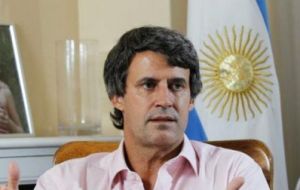MercoPress. South Atlantic News Agency
Argentina transfers 400 million dollars to IMF to have greater access to emergency cash
 Alfonso Prat-Gay said the Argentine government is only interested in grabbing the “1.6 billion dollars”
Alfonso Prat-Gay said the Argentine government is only interested in grabbing the “1.6 billion dollars” Argentina which the IMF censured for underreporting inflation less than three months ago after three warnings over the past two years, last week authorized the deposit of 400 million dollars with the Washington-based lender to increase the nation’s access to emergency cash.
The move will boost Argentina’s special drawing rights that currently total 3.2 billion dollars and comes as international reserves declined to a six-year low of 39.8 billion dollars.
Fernandez, who has also criticized the IMF for causing the country’s record 95 billion default in 2001, is using the bank to bolster her dwindling supply of dollars as a decade-long legal dispute with holdout creditors and her increasing influence over the economy leaves Argentina as the world’s least creditworthy debtor nation based on swaps trading.
“They’re doing this because they’re worried, and the special drawing rights help them have more liquidity,” said Claudio Loser, a former IMF director who now heads research firm Centennial Group Latin America. “Once the drawing rights are approved, they can use the money practically immediately, like cash.”
The planned increase in Argentina’s deposits with the fund is in response to the IMF 2010 call for increased contributions from members as part of a “package of far- reaching reforms of the fund’s quotas and governance”. However the IMF proposal still needs the approval of the U.S. Congress.
Argentina used its special drawing rights in 2000, 2001 and 2003, Fund data show. In January 2006, Cristina Fernandez’ late husband and predecessor Nestor Kirchner paid back the country’s 9.5 billion debt to the fund, saying he wanted to be free of the IMF “dictatorship” which he blamed for the country’s indebtedness and default.
Argentina also received as much as 2.7 billion in a general allocation of funds by the lender in 2009, returning them by the end of that year. It currently owes nothing to the IMF.
The government of Cristina Fernandez has used Central bank reserves to pay foreign debt and is short of dollars since it still is litigating with sovereign bond holdouts and has no access to voluntary money markets.
An increase in drawing rights won’t improve Argentina’s creditworthiness or reduce its borrowing costs, according to Aldo Pignanelli, a former central bank president. For that to happen, the government needs to reduce its fiscal deficit, which increased last year to the widest since 2001, and improve the accuracy of its statistics.
Investors demand 11.96 percentage points more to own Argentine bonds instead of US Treasuries, leaving the nation as the only distressed borrower among 55 emerging markets tracked by JPMorgan.
In February, Argentina became the first member country to be censured by the IMF for not providing accurate data on inflation and economic growth under a procedure that can end in expulsion. The government’s data has been questioned by economists since early 2007, when Kirchner changed personnel at the statistics agency.
Consumer prices rose 24.4% in March from a year earlier, according to a report by opposition lawmakers that is based on estimates by independent economists, who face fines if they release statistics that differ from official data. But the statistics agency said inflation was 10.6% in that period.
Since Nestor Kirchner’s break with the fund in 2006, Argentina has been the only Group of 20 nations that hasn’t allowed the lender to review its finances, which is mandatory for all.
If the US approves the proposal, Argentina will be eligible to receive sufficient funds to ensure that it can maintain debt payments over the next few years, according to Alfonso Prat-Gay, an opposition lawmaker and former central bank president.
The government “is just trying to grab 1.6 billion so that it can take it easy, perhaps until 2015,” Prat-Gay told the Lower House of congress on April 17.
The Argentine Lower House passed the bill allowing the 400 million dollars for the IMF two weeks ago in the midst of a furious debate over judicial reform which meant the event went undisturbed.
The IMF overall increase means BRICS members (Brazil, Russia, India, China and South Africa) will reach 14.76% of votes in the Fund. If to this is added the 1,59% of the chair Argentina represents five other countries, the figure jumps to over 15% which grants veto power for some of Fund’s decisions.




Top Comments
Disclaimer & comment rules-

-

-

Read all commentsWe are just preparing another heist of IMF funds.
Apr 29th, 2013 - 08:33 pm 0Get ready to lose more tax dollars that we aren’t ever going to pay you back.
HAHAHAHAHA
Losers!
Jesus H. Christ, please tell me the IMF is not that stupid...
Apr 29th, 2013 - 08:39 pm 0...well maybe.
At least the president of the IMF wears trousers, well sometimes...
Professional swindlers...
US Treasury just told Congress that Argentina is a lying scofflaw and USA will vote against in at IMF WB AND IDB.
Apr 29th, 2013 - 08:49 pm 0Not gonna be pretty
Commenting for this story is now closed.
If you have a Facebook account, become a fan and comment on our Facebook Page!